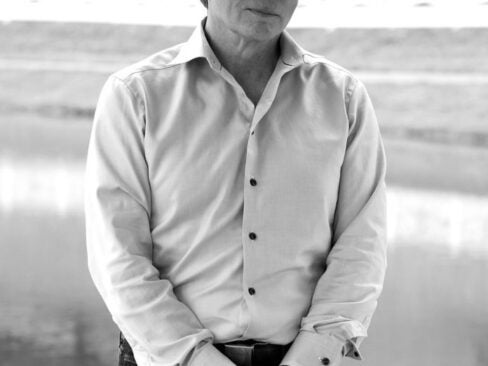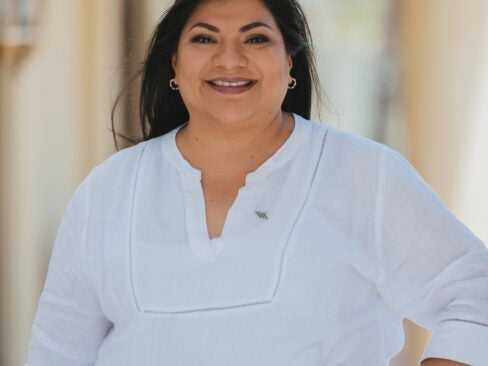
Creative Director Ports 1961
The allure of Ports 1961’s sophisticated, feminine ready-to-wear collection owes much to the distinctive vision of Creative Director Tia Cibani. On board with parent company Ports International for more than a decade, Cibani has led the Ports 1961 label since its 2004 inception. Known to pluck influences from around the world when seeking new inspiration—Africa, Argentina and Scotland have influenced past collections—Cibani’s background is just as diverse. The Libya-born, Vancouver-bred designer spent more than a decade designing in China before relocating to Manhattan in 2007. Having just opened the first U.S. Ports 1961 boutiques, Elite Traveler Style Editor Tanya Dukes met with Cibani at the brand’s New York location to talk about her latest inspiration, the boutique building process and the details of creative direction.
ET: Your most recent collection took a lot of inspiration from Indian culture and style. How’d that come about? Have you been there before?
Tia Cibani: I haven’t been yet! I’ve been wanting to go to India forever. We’re about to go there to shoot the new campaign, and I’m so excited. Our whole team is like a family, and I’m really looking forward to going there and experiencing the culture and exploring as much as I can. It’s a really fascinating place. Our head designer is from India, and I think that it has a special significance to her for that reason. My [Ports 1961] girl loves the world, loves to travel, and it’s such an exciting, booming culture, so the time was right. It’s funny to think about the origins of the fall collection because we’re always working so far ahead. I’m onto spring 2010!
ET: What’s the experience like of developing a collection around a destination you’ve never visited?
Tia Cibani: In this day and age it makes very little difference. I know the culture of South Asia. I lived in China. I’ve traveled to Southeast Asia a lot, so I feel connected enough to the culture that if I research and read my books, it doesn’t really make a difference. You can research so much online and in the library. I think you are more emotionally connected to a theme or an inspiration if you’ve been to the place and have met the people. From a directional, inspirational point of view—colors, shapes—I don’t think it makes a difference.
ET: You’ve lived all over the world. Did that background influence your career?
Tia Cibani: Maybe I was made for this? I was born in Libya and then traveled to Canada, but through a number of different places along the way. As a young child I longed to explore and wanted to go back to Africa. Then, moving on to China and meeting a huge expatriate community inspired me to explore the rest of the world and the rest of Asia. I feel that I was meant to do something that was connected to travel. I feel like I was born to do it. It’s been part of me from the beginning. I didn’t calculate it that way. It just kinda happened.
ET: You’ve been with Ports International for more than a decade. And you were part of developing the Ports 1961 label outset. Do you feel like you’ve made it your own?
Tia Cibani: It’s so rewarding. I feel in some ways that I did start this from scratch…not totally. It is a brand that’s existed since 1961. It had a legacy of giving quality and femininity for a certain woman. Even though I never met him, I felt like I connected with the founder, Mr. Tanabe. I understood that he intended to say something connected to travel just by looking at the logo—the words “Ports International” with a globe. It was the 1960s, the age of sexy travel, the PanAm logo… It just fit well with what I’m doing today. Since the brand was absent from North America for 10 years, I feel like I pulled from its history but really had a fresh, clean slate to start with. I was able to take a drastically different direction from what the product was before. Having the absence was really nice for me. I was able to say exactly what I wanted say, but in connection with what Mr. Tenabe wanted to say back in 1961. It made sense.
ET: You returned to New York after more than a decade in China? What’s the transition been like?
Tia Cibani: I studied in New York before and stopped my studies to explore the China opportunity [with Ports]. I thought it would be a little stint, 6 months, a year max. And then three years went by, and then five years went by, and then 10 years went by, but I still longed to be back in New York. I think it’s the greatest city on Earth no matter what anybody says. I love it. There are some pretty amazing cities out there. I love Shanghai, but I really feel like New York is home for me. Throughout the ten years in China, I had it in my mind that I wanted to bring Ports back to the North American market with a different face. After 10 years, I said to my CEO, “Let’s give it a go.” It’s a good time for us financially and I feel ready, personally. I feel connected to what I’m doing.
ET: Does working in New York change your point of view?
Tia Cibani: Absolutely. Having been in Asia for ten years, I really feel that I grew up there. Who I am today has mostly do to my ten years in Asia. Before, I was catering to the Chinese woman, and I was growing with her. I felt like with every season, with every year, I was able to deliver to that customer exactly what she needed because I was in her air. And I think it’s important for me to be in this [American] client’s air. It’s changed me because I’m embodying this woman here. I’d like to understand her, get to know her, and to cater to her. I’m not neglecting my girl in China, because she’s always going to be a part of me. It’s never going to leave me, but now I’m embracing this.
ET: The Meatpacking District boutique just opened. What was it like to develop the new concept from scratch?
Tia Cibani: It’s been really special. The collection was developed before it had a home, a package for how it should be presented. When we first started to meet with the architect [Michael Gabellini] to develop the store concept I showed him the product. I showed him the campaign images, [and] I let him meet the team that works on the product. I wanted him to really understand who we are—the nuances of what we love about our product and to express it in the space. We didn’t create a retail concept and then a collection to go in it. This is home for this product. It really fits in the space. It was really well thought out.
It was challenging for a couple of reasons. To come up with a brand new concept from scratch takes a special process. Michael and I had to get to know each other. He came to my place. I went to his place. We had dinners together. What’s really great is that we didn’t rush the process. That’s for sure! This particular space had its issues because it’s 150 years old and it was neglected. When we went into demolition, we realized that it was a bigger project than we intended, but we didn’t abandon it. We stuck with it. We said we would open a store here, and we did it. A lot of people might have been intimidated by that and walked away. We really were determined to make this our home and create something special out of a building that was falling apart and neglected for a long time. We’ve been so embraced by the neighborhood. The neighbors have dropped off champagne! It’s a nice community.
ET: Is this the blueprint for your future boutiques?
Tia Cibani: Yes, but with respect to each environment. In L.A., we discovered an amazing wood ceiling during demolition. Now, the boutique has a revealed ceiling. It made construction more complicated, but it’s worth it to respect the integrity of each neighborhood. This is the general prototype. New York feels a little more masculine, more industrial, and that’s in keeping with being in the Meatpacking District and the history of this site.
ET: You sound incredibly hands-on. Are you involved in every aspect of the brand?
Tia Cibani: Yes. Sometimes too much! I am involved in everything—right down to the tissue paper. It has to be the right shade of grey! I think about the shopping bags, their size…all of it. It’s important. As creative director, my job is to oversee all the pieces of the puzzle that make up the entire message. As creative director, it is important to let everything pass in front of my eyes. And I love it. I don’t say no to anything.
ET: Being so busy, have you had the time to do much travel strictly for fun?
Tia Cibani: At the top of my list has been Japan and Vietnam. Both in Asia—that says a lot. I climbed Mount Fuji. I’ve only climbed one mountain in my life, but I promised myself I would do it. It was such an exhilarating experience. You forgot about the pressures of work and everything else. It took almost ten hours. It seemed like all of Japan was there because it was a national holiday. And I loved going to Hanoi and Da Nang. I think my favorite destinations are more about the experience you have and who you share it with. There’s a huge world out there, and I have a lot of exploring to do. I’m not done.










